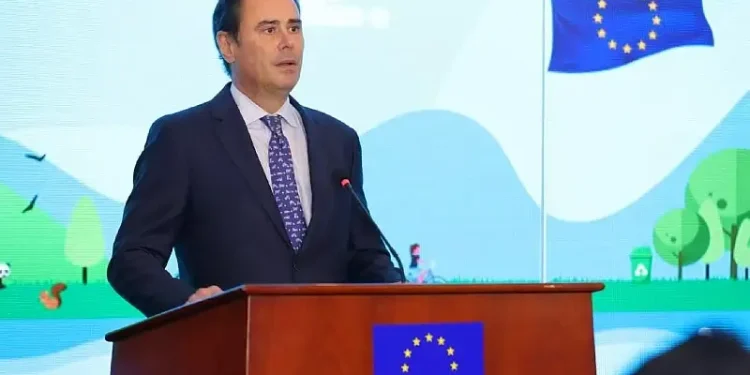Fifty years of diplomatic ties provided a compelling reason for European and Chinese leaders to meet in Beijing this week.
But beyond the commemorative tone, the discussions zeroed in on today’s urgent realities: the need to recalibrate EU-China relations and align shared interests amidst global tension.
A Shift from Dialogue to Delivery
EU Ambassador Jorge Toledo opened the one-day event by calling for tangible progress. “It’s high time for the two partners to go beyond mere dialogue,” he asserted.
His statement reflected growing European concerns that geopolitical dialogue with China must yield measurable results, particularly around regional security concerns, human rights, and China trade policy.
From trade imbalances to sustainable development, the conference emphasized the need for deeper strategic cooperation. Upcoming diplomatic events such as the EU-China Summit and High-Level Dialogues will be critical litmus tests of that intent.
• Ambassador Toledo emphasized a rules-based approach rooted in fairness, reciprocity, and mutual accountability.
• China’s Li Jian highlighted the complementarity of “Chinese-style modernization” and European integration.
European Priorities: Cooperation with Conditions
The European Union’s tone signaled cautious optimism. Keynote speaker Michel Barnier—former French Prime Minister and Chief EU Brexit Negotiator—stressed Europe’s dual role as a peace-builder and a responsible partner.
He noted that EU foreign policy must be guided by principle and pragmatism.
His message reinforced the EU’s intent to engage China constructively, particularly on green transition efforts, IP protection, and rules-based trade frameworks.
Discussion Themes and Strategic Goals
| Focal Areas | Strategic Goal |
|---|---|
| Geopolitical Dialogue | Maintain open channels while defending EU values |
| Trade and Economy | Address structural imbalances in China trade policy |
| Green Transition | Expand green transition efforts through joint action |
| Intellectual Property | Strengthen intellectual property rights enforcement |
| Development Cooperation | Align on global development goals |
| Regional & Global Security | Tackle regional security concerns together |
Navigating Global Pressures
While the EU engages with Beijing, Washington watches closely. The U.S. remains skeptical of China’s outreach, fearing that closer EU-China relations might undercut Western unity—especially concerning Russia and sanctions.
However, many in Brussels see engagement as a tool for influence, not concession. In a multipolar world, multilateral engagement may offer Europe more leverage than isolation.
The conference, therefore, isn’t just symbolic—it’s strategic. As both parties navigate global uncertainties, their choices will shape the future of strategic cooperation and multilateral engagement across continents.
Practical Takeaways for Europe
-
EU foreign policy must balance values and interests amid shifting global alliances.
-
Deepening EU-China relations can strengthen Europe’s global standing—if approached with clarity and resolve.
-
Protecting intellectual property rights and ensuring fair trade remain non-negotiable priorities.
Additional Reading Material
A Partnership Under Revision
The EU-China conference in Beijing offered more than diplomacy—it mapped out a cautious path toward realignment.
As global power dynamics evolve, this recalibrated relationship will demand responsibility, resilience, and realism from both sides.
Sources: European Union, Newsweek, Euro News, and European Capital Insights.
Prepared by Ivan Alexander Golden, Founder of THX News™, an independent news organization delivering timely insights from global official sources. Combines AI-analyzed research with human-edited accuracy and context.








